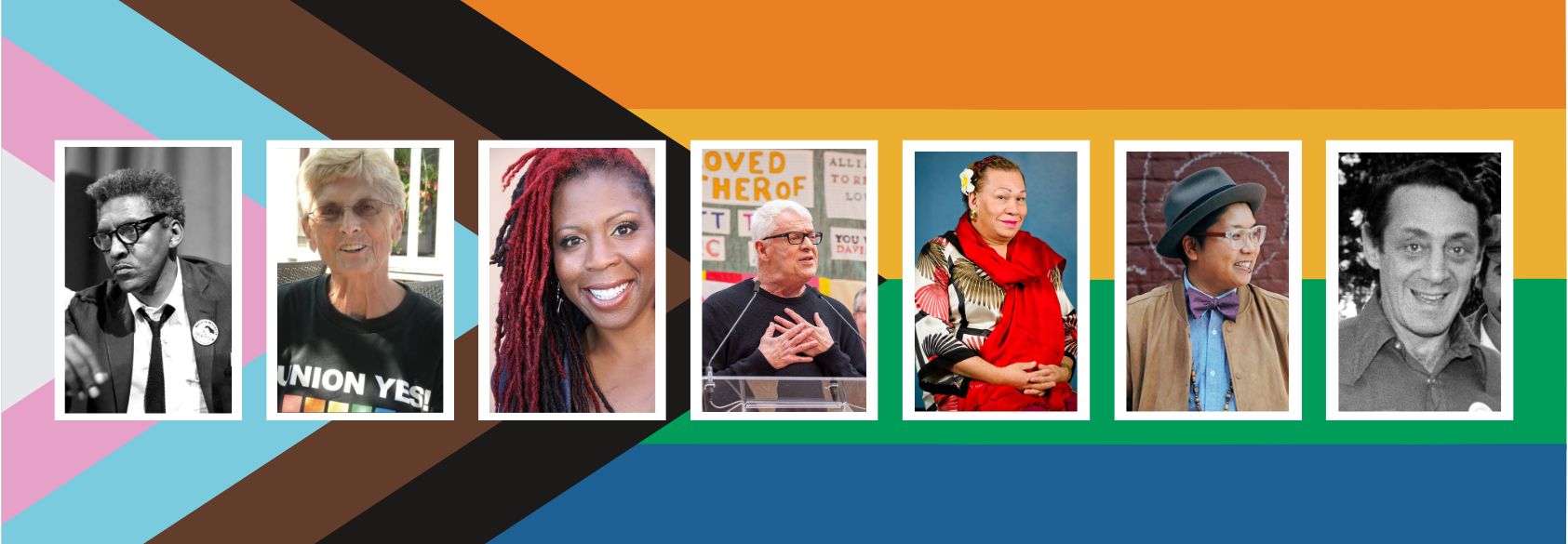Pride and Power: Honoring LGBTQ Labor Leaders
These leaders didn’t just fight for workers’ rights—they reshaped the labor movement. Their stories empower the next generation to lead with pride and purpose.

From left to right: Bayard Rustin, Nancy Wohlforth, Jasmyne Cannick, Cleve Jones, Lorena Borjas, Kay Ulanday Barrett, and Harvey Milk—trailblazers whose advocacy shaped both the labor and LGBTQIA+ movements.
Share
June 2, 2025
These leaders didn’t just fight for workers’ rights—they reshaped the labor movement. Their stories empower the next generation to lead with pride and purpose.
Share
Every June, Pride Month invites us to reflect on the achievements and resilience of the LGBTQIA+ community—but it’s also a powerful opportunity to recognize how queer leaders have shaped other pivotal movements in U.S. history, including the labor movement.
When I was young—even into early adulthood—it was difficult to come out, partly because I rarely saw openly queer people in public life. That lack of visibility made it hard to imagine a future where I could be fully myself. While acceptance has grown in many places, it’s still not guaranteed. A recent New York Times article even explored how many people—especially those in public roles—still feel pressure to hide their identities today. That’s why learning about queer leaders is so important.
When young people see queer adults thriving—leading, organizing and making history—it reinforces the belief that they too can live openly and purposefully. Representation like this isn't just inspiring; it’s life-affirming, contributing to stronger mental health and a deeper sense of belonging for LGBTQ youth.
Their stories help me, and others, feel seen and validated in a world that hasn't always welcomed us.
In many ways, the bravery and advocacy of these leaders not only transformed the workplace, but also helped pave the way for a more inclusive, equitable society—one where younger generations can see themselves represented and empowered to lead. Research from the Trevor Project shows that LGBTQ youth who have visible adult role models experience significantly lower rates of suicide and a greater sense of belonging. Additional findings from the National Institutes of Health reinforce that affirming, inclusive environments improve mental health and identity development outcomes for LGBTQ individuals. These leaders' visibility is more than symbolic—it’s a lifeline.
Rooted in a shared commitment to justice, these individuals represent the best of the labor movement—often expanding its scope to include marginalized workers who had long been left out of traditional union narratives. These individuals stood at the intersection of identity and activism, fighting not just for workers’ rights, but for dignity, representation and justice for all. Their stories belong in our classrooms, our civic education and our collective memory.

A brilliant strategist behind the 1963 March on Washington for Jobs and Freedom, Rustin was a Black gay man whose work in the civil rights and labor movements often went unrecognized due to homophobia. He advised labor leader A. Philip Randolph and fought for economic justice alongside civil rights.

A trailblazer in union leadership, Wohlforth became the first openly LGBTQIA+ officer of a major U.S. labor union. She co-founded Pride at Work, an organization dedicated to advancing workplace protections within the labor movement.

A journalist, media strategist and advocate, Cannick shines a spotlight on workplace inequities faced by Black queer workers. Her work calls out systemic injustice and pushes for real accountability in hiring and labor practices.

An organizer with UNITE HERE and the creator of the AIDS Memorial Quilt, Jones has long been a voice for LGBTQIA+ rights and labor solidarity. His work continues to bridge the fight for healthcare, dignity and fair labor practices.

A trans Latina immigrant and fierce advocate for sex workers and undocumented laborers in New York City. Borjas’ grassroots activism provided life-saving support to marginalized workers who were often ignored by traditional labor systems.

A poet and performer whose advocacy spans disability justice, racial equity and labor rights. Barrett’s voice brings intersectional awareness to labor organizing, emphasizing the lived experiences of queer and disabled workers.

One of the first openly gay elected officials in the U.S., Milk was a passionate advocate for workers’ rights, forming alliances with unions like the Teamsters to support inclusive hiring and economic justice. His political activism linked LGBTQIA+ liberation with labor power, setting a powerful precedent for intersectional advocacy.
The labor movement is stronger when it reflects the full diversity of its members. Queer leaders in labor have pushed unions to be more inclusive, shaping workplace policies that uplift all workers, regardless of gender identity or sexual orientation. From healthcare equity to anti-discrimination protections, their efforts have left lasting impacts.
For educators, these narratives are essential teaching tools. They illuminate connections between social justice, labor history and civic action. They encourage students to think critically about equity, to see themselves as future change-makers, and to honor the courage it takes to lead authentically.
Seeing the courage and impact of leaders like Bayard Rustin, Nancy Wohlforth and Kay Ulanday Barrett reminds me that visibility matters—and that living openly can be a powerful act of leadership in itself. Their stories help me, and others, feel seen and validated in a world that hasn't always welcomed us. Their legacy reminds us that the work of building an inclusive labor movement is ongoing. It calls each of us to action—whether that’s sharing these stories, advocating for just policies, or making space for every worker to thrive.
Not all of these leaders held a union card—but all of them led. Through advocacy, organizing and coalition-building, they advanced the cause of worker justice in ways that continue to shape the labor movement today. Their work reminds us that labor leadership takes many forms—and every voice matters.
When we lift up the stories of queer labor leaders, we carry forward a legacy of courage, solidarity and justice. Let’s continue to lift up their voices—in our classrooms, union halls and communities—so the legacy of inclusive labor leadership lives on.
Support and celebrate LGBTQIA+ students and inspire meaningful advocacy with these free lesson plans, activities and educator resources.
Want to see more stories like this one? Subscribe to the SML e-newsletter!
